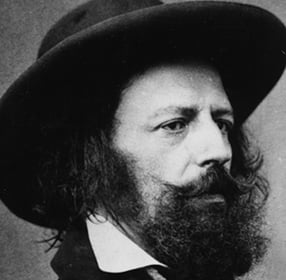The Death of the Old Year
Full knee-deep lies the winter snow,
And the winter winds are wearily sighing:
Toll ye the church bell sad and slow,
And tread softly and speak low,
For the old year lies a-dying.
Old year you must not die;
You came to us so readily,
You lived with us so steadily,
Old year, you shall not die.
He lieth still: he doth not move:
He will not see the dawn of day.
He hath no other life above.
He gave me a friend and a true truelove
And the New-year will take ’em away.
Old year you must not go;
So long you have been with us,
Such joy as you have seen with us,
Old year, you shall not go.
He froth’d his bumpers to the brim;
A jollier year we shall not see.
But tho’ his eyes are waxing dim,
And tho’ his foes speak ill of him,
He was a friend to me.
Old year, you shall not die;
We did so laugh and cry with you,
I’ve half a mind to die with you,
Old year, if you must die.
He was full of joke and jest,
But all his merry quips are o’er.
To see him die across the waste
His son and heir doth ride post-haste,
But he’ll be dead before.
Every one for his own.
The night is starry and cold, my friend,
And the New-year blithe and bold, my friend,
Comes up to take his own.
How hard he breathes! over the snow
I heard just now the crowing cock.
The shadows flicker to and fro:
The cricket chirps: the light burns low:
’Tis nearly twelve o’clock.
Shake hands, before you die.
Old year, we’ll dearly rue for you:
What is it we can do for you?
Speak out before you die.
His face is growing sharp and thin.
Alack! our friend is gone,
Close up his eyes: tie up his chin:
Step from the corpse, and let him in
That standeth there alone,
And waiteth at the door.
There’s a new foot on the floor, my friend,
And a new face at the door, my friend,
A new face at the door.
This poem is in the public domain. Published in Poem-a-Day on December 31, 2022, by the Academy of American Poets
“The Death of the Old Year” was first published in Alfred, Lord Tennyson’s second collection, titled Poems (Edward Moxon, 1833). “The Death of the Old Year,” considered by some to be a spiritual predecessor to section CVI of Tennyson’s “In Memoriam A. H. H.,” was popular among many of Tennyson’s contemporaries, including Ralph Waldo Emerson, who recorded in his private journal that the poem was his favorite from the collection. The poem’s popularity was even such that it led to accusations of plagiarism against similar poems: Edgar Allan Poe, in a trenchant review of Henry Wadsworth Longfellow’s collection Voices of the Night (John Owen, 1839), published in Burton’s Gentleman’s Magazine vol. 6, no. 102 (February, 1840), wrote that Longfellow’s poem “Midnight Mass for the Dying Year” was an act of plagiarism “too palpable to be mistaken; and which belongs to the most barbarous class of literary robbery; that class in which, while the words of the wronged author are avoided, his most intangible, and therefore his least defensible and least reclaimable property, is purloined.” As John Olin Eidson, former professor of American literature and president of Georgia Southern College, reports in Tennyson in America: His Reputation and Influence from 1827 to 1858 (The University of Georgia Press, 1943), “When Longfellow heard of the accusation, he wrote, ‘I did not even know that he [Tennyson] had written a piece on this subject.’ Longfellow, however, had owned in 1837 a copy of Tennyson’s 1833 volume containing the poem.”

